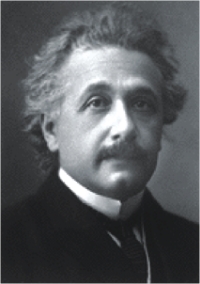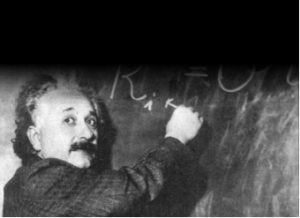|
Campus Feature
I am fascinated by Albert Einstein
Javed Sattar
The more I read about Albert Einstein the more I become fascinated by this scientist. This great physician is considered a super brain in this world of pea-brains all around us. He has come up with some ground-breaking scientific theories on the basis of which modern science has progressed to its present position. Among these are: Theory of relativity, problems of the theory of radiation, statistical mechanics and unified field theories. Well, I cannot check the temptation of giving a sketch of the life and work of this great scientist of all times. I hope you will enjoy reading the following facts about him I have collaged from the Internet.
"Albert Einstein was born in Germany 1879. In 1901 he obtained his diploma and acquired Swiss citizenship. But as he was unable to find a teaching post, he accepted a position as technical assistant in the Swiss Patent Office. However, he obtained his doctor's degree in 1905.
“In 1909 he became Professor Extraordinary at Zurich, in 1911 Professor of Theoretical Physics at Prague, returning to Zurich in the following year to fill a similar post. In 1914 he was appointed Director of the Kaiser Wilhelm Physical Institute and Professor in the University of Berlin. He became a German citizen in 1914 and remained in Berlin until 1933 when he renounced his citizenship for political reasons and emigrated to America to take the position of Professor of Theoretical Physics at Princeton. He became a United States citizen in 1940 and retired from his post in1945.
 Einstein in his youth |
"After World War II, Einstein was a leading figure in the World Government Movement, he was offered the Presidency of the State of Israel, which he declined, and he collaborated with Dr. Chaim Weizmann in establishing the Hebrew University of Jerusalem.
At the start of his scientific work, Einstein realised the inadequacies of Newtonian mechanics and his special theory of relativity stemmed from an attempt to reconcile the laws of mechanics with the laws of the electromagnetic field. He dealt with classical problems of statistical mechanics and problems in which they were merged with quantum theory: this led to an explanation of the Brownian movement of molecules. He investigated the thermal properties of light with a low radiation density and his observations laid the foundation of the photon theory of light.
"In his early days in Berlin, Einstein postulated that the correct interpretation of the special theory of relativity must also furnish a theory of gravitation and in 1916 he published his paper on the general theory of relativity. During this time he also contributed to the problems of the theory of radiation and statistical mechanics.
“In the 1920's, Einstein embarked on the construction of unified field theories, although he continued to work on the probabilistic interpretation of quantum theory, and he persevered with this work in America. He contributed to statistical mechanics by his development of the quantum theory of a monatomic gas and he has also accomplished valuable work in connection with atomic transition probabilities and relativistic cosmology.
“Einstein's researches are, of course, well chronicled and his more important works include Special Theory of Relativity (1905), Relativity (English translations, 1920 and 1950), General Theory of Relativity (1916), Investigations on Theory of Brownian Movement (1926), and The Evolution of Physics (1938). Among his non-scientific works, About Zionism (1930), Why War? (1933), My Philosophy (1934), and Out of My Later Years (1950) are perhaps the most important.
"Einstein's gifts inevitably resulted in his dwelling much in intellectual solitude and, for relaxation, music played an important part in his life. He married Mileva Maric in 1903 and they had a daughter and two sons; their marriage was dissolved in 1919 and in the same year he married his cousin, Elsa Löwenthal, who died in 1936. He died on April 18, 1955 at Princeton, New Jersey."
Well, you have just read about his early life. Now, I am giving below some interesting facts about his old-age eccentricities. They are hilarious I can promise you. Just have the patience and read all the way to the bottom. By the way, whole lot of information on Einstein is available on the Internet.
 Ten obscure facts concerning Albert Einstein Ten obscure facts concerning Albert Einstein
1. He Liked His Feet Naked
"When I was young, I found out that the big toe always ends up making a hole in the sock," he once said. "So I stopped wearing socks." Einstein was also a fanatical slob, refusing to "dress properly" for anyone. Either people knew him or they didn't, he reasoned - so it didn't matter either way.
2. He Hated Scrabble
Aside from his favourite past-time sailing ("the sport which demands the least energy"), Einstein shunned any recreational activity that required mental agility. As he told the New York Times, "When I get through with work I don't want anything that requires the working of the mind."
3. He Was A Rotten Speller
Although he lived for many years in the United States and was fully bilingual, Einstein claimed never to be able to write in English because of "the treacherous spelling". He never lost his distinctive German accent either, summed up by his catch-phrase "I vill a little t'ink".
4. He Loathed Science Fiction
Lest it distort pure science and give people the false illusion of scientific understanding, he recommended complete abstinence from any type of science fiction. "I never think of the future. It comes soon enough." He also thought people who claimed to have seen flying saucers should keep it to themselves.
5. He Smoked Like A Chimney
A life member of the Montreal Pipe Smokers Club, Einstein was quoted as saying: "Pipe smoking contributes to a somewhat calm and objective judgment of human affairs." He once fell into the water during a boating expedition but managed heroically to hold on to his pipe.
6. He Wasn't Much Of A Musician
Einstein would relax in his kitchen with his trusty violin, stubbornly trying to improvise something of a tune. When that didn't work, he'd have a crack at Mozart.
7. Alcohol Was Not His Preferred Drug
At a press conference upon his arrival to New York in 1930, he said jokingly of Prohibition: "I don't drink, so it's all the same to me." In fact, Einstein had been an outspoken critic of "passing laws which cannot be enforced".
8. He Equated Monogamy With Monotony
"All marriages are dangerous," he once told an interviewer. "Marriage is the unsuccessful attempt to make something lasting out of an incident." He was notoriously unfaithful as a husband, prone to falling in love with somebody else directly after the exchanging of vows.
9. His Memory Was Short
Believing that birthdays were for children, his attitude is summed up in a letter he wrote to his girlfriend Mileva Maric: "My dear little sweetheart ... first, my belated cordial congratulations on your birthday yesterday, which I forgot once again."
10. His Cat Suffered Depression
Fond of animals, Einstein kept a housecat which tended to get depressed whenever it rained. Ernst Straus recalls him saying to the melancholy cat: "I know what's wrong, dear fellow, but I don't know how to turn it off."
Copyright
(R) thedailystar.net 2006 |
